
7 Up is an American brand of lemon-lime-flavored non-caffeinated soft drink. The rights to the brand are held by Keurig Dr Pepper in the United States and by PepsiCo in the rest of the world. The U.S. version of the 7 Up logo includes a red-orange circle between the "7" and "Up"; this red-orange circle has been animated and used as a mascot for the brand as Cool Spot. Before that, the mascot was a fictional character named Fido Dido created by Joanna Ferrone and Sue Rose. He is used outside the U.S. for limited time retro cups, although the last time and location is not known. 7 Up competes primarily against The Coca-Cola Company's Sprite.

Potash is the name used for various mined and manufactured salts that contain potassium in water-soluble form. The name derives from pot ash, which refers to plant ashes or wood ash soaked in water in a pot, the primary means of manufacturing the product before the Industrial Era. The word potassium is derived from potash.
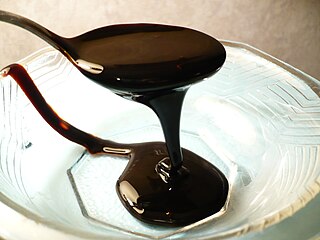
Molasses is a viscous substance resulting from refining sugarcane or sugar beets into sugar. Molasses varies in the amount of sugar, method of extraction and age of the plant. Sugarcane molasses is primarily used to sweeten and flavour foods. Molasses is a major constituent of fine commercial brown sugar. It is also one of the primary ingredients used to distill rum.
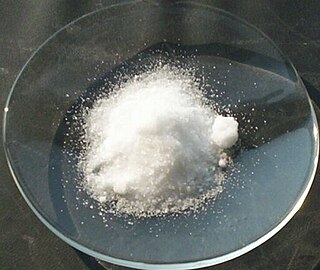
Potassium nitrate is a chemical compound with the chemical formula KNO
3. It is an ionic salt of potassium ions K+ and nitrate ions NO3−, and is therefore an alkali metal nitrate. It occurs in nature as a mineral, niter (or nitre in the UK). It is a source of nitrogen, and nitrogen was named after niter. Potassium nitrate is one of several nitrogen-containing compounds collectively referred to as saltpetre (or saltpeter in North America).
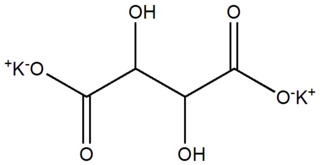
Potassium tartrate, dipotassium tartrate or argol has formula K2C4H4O6. It is the potassium salt of tartaric acid. It is often confused with potassium bitartrate, also known as cream of tartar. As a food additive, it shares the E number E336 with potassium bitartrate.
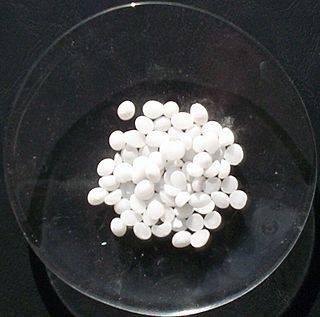
A lye is a metal hydroxide traditionally obtained by leaching wood ashes, or a strong alkali which is highly soluble in water producing caustic basic solutions. "Lye" most commonly refers to sodium hydroxide NaOH, but historically has been used for potassium hydroxide KOH.

Potassium bicarbonate (IUPAC name: potassium hydrogencarbonate, also known as potassium acid carbonate) is the inorganic compound with the chemical formula KHCO3. It is a white solid.
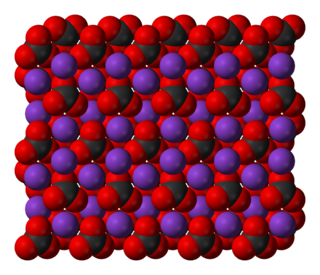
Potassium carbonate is the inorganic compound with the formula K2CO3. It is a white salt, which is soluble in water. It is deliquescent, often appearing as a damp or wet solid. Potassium carbonate is mainly used in the production of soap and glass.

Potassium chlorate is a compound containing potassium, chlorine and oxygen, with the molecular formula KClO3. In its pure form, it is a white crystalline substance. After sodium chlorate, it is the second most common chlorate in industrial use. It is a strong oxidizing agent and its most important application is in safety matches. In other applications it is mostly obsolete and has been replaced by safer alternatives in recent decades. It has been used

Acesulfame potassium, also known as acesulfame K or Ace K, is a synthetic calorie-free sugar substitute often marketed under the trade names Sunett and Sweet One. In the European Union, it is known under the E number E950. It was discovered accidentally in 1967 by German chemist Karl Clauss at Hoechst AG. In chemical structure, acesulfame potassium is the potassium salt of 6-methyl-1,2,3-oxathiazine-4(3H)-one 2,2-dioxide. It is a white crystalline powder with molecular formula C
4H
4KNO
4S and a molecular weight of 201.24 g/mol.

Sulfites or sulphites are compounds that contain the sulfite ion, SO2−
3. The sulfite ion is the conjugate base of bisulfite. Although its acid is elusive, its salts are widely used.

Breyers is a brand of ice cream started in 1866 by William A. Breyer in Philadelphia, Pennsylvania.

Maltesers are a British confectionery product manufactured by Mars, Incorporated. First sold in the UK in 1937, they were originally aimed at women. They have since been sold in Europe, Australia, New Zealand, Canada, and, since 2017, the US and Middle East. The slogan is "The lighter way to enjoy chocolate".

Miracle Whip is a sauce condiment manufactured by Kraft Heinz and sold throughout the United States and Canada. It is also sold by Mondelēz International as "Miracel Whip" throughout Germany. It was developed as a less expensive alternative to mayonnaise in 1933.

Losartan, sold under the brand name Cozaar among others, is a medication used to treat high blood pressure (hypertension). It is also used for diabetic kidney disease, heart failure, and left ventricular enlargement. It is taken by mouth. It may be used alone or in addition to other blood pressure medication. Up to six weeks may be required for the full effects to occur.

Adipates are the salts and esters of adipic acid. The anionic (HO2C(CH2)4CO2−) and dianionic (−O2C(CH2)4CO2−) forms of adipic acid are also referred to as adipate.

Modified starch, also called starch derivatives, are prepared by physically, enzymatically, or chemically treating native starch to change its properties. Modified starches are used in practically all starch applications, such as in food products as a thickening agent, stabilizer or emulsifier; in pharmaceuticals as a disintegrant; or as binder in coated paper. They are also used in many other applications.
Bis(2-ethylhexyl) adipate or DEHA is an organic compound with the formula (CH2CH2CO2C8H17)2. It is the diester of 2-ethylhexanol and adipic acid. It is a colorless oily liquid.
The topic of sulfite food and beverage additives covers the application of sulfites in food chemistry. "Sulfite" is jargon that encompasses a variety of materials that are commonly used as preservatives or food additive in the production of diverse foods and beverages. Although sulfite salts are relatively nontoxic, their use has led to controversy, resulting in extensive regulations. Sulfites are a source of sulfur dioxide (SO2), a bactericide.

















